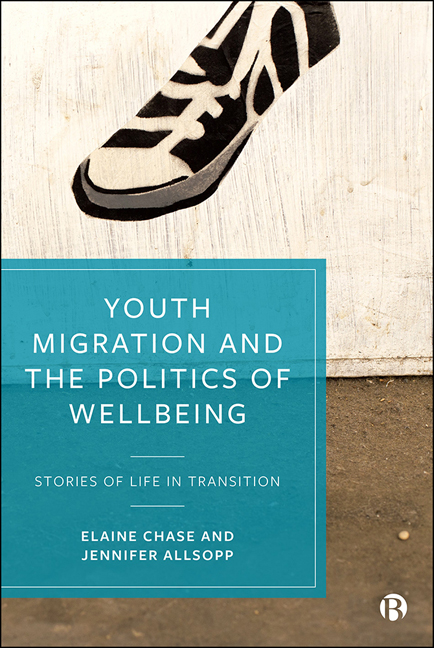Book contents
- Frontmatter
- Contents
- List of Figures
- Acknowledgements
- Foreword
- ‘Future’
- 1 Introduction
- 2 Conceptualizing Wellbeing in the Context of Migration and Youth Transitions
- 3 Capturing Wellbeing in Transition: An Alternative Approach
- 4 ‘Iron Rod’ or ‘Colander’? Welfare Regimes in England and Italy
- 5 The Pursuit of Safety and Freedom
- 6 Legal Integrity and Recognition
- 7 Identity and Belonging
- 8 Constructing Viable Futures as ‘Adults’
- 9 Emotional and Mental Wellbeing
- 10 Friendships, Connections and Relationships
- 11 Transnational Family and Connections
- 12 Conclusion
- Endnotes
- References
- Index
2 - Conceptualizing Wellbeing in the Context of Migration and Youth Transitions
Published online by Cambridge University Press: 21 April 2021
- Frontmatter
- Contents
- List of Figures
- Acknowledgements
- Foreword
- ‘Future’
- 1 Introduction
- 2 Conceptualizing Wellbeing in the Context of Migration and Youth Transitions
- 3 Capturing Wellbeing in Transition: An Alternative Approach
- 4 ‘Iron Rod’ or ‘Colander’? Welfare Regimes in England and Italy
- 5 The Pursuit of Safety and Freedom
- 6 Legal Integrity and Recognition
- 7 Identity and Belonging
- 8 Constructing Viable Futures as ‘Adults’
- 9 Emotional and Mental Wellbeing
- 10 Friendships, Connections and Relationships
- 11 Transnational Family and Connections
- 12 Conclusion
- Endnotes
- References
- Index
Summary
Introduction
With its numerous meanings and associations, the concept of wellbeing is as nebulous as it is prolific in contemporary life. This chapter considers some dominant notions, definitions and attempts at measuring wellbeing. It then goes on to consider the relevance and application of these conceptualizations of wellbeing to the lives and circumstances of unaccompanied migrant young people undergoing multiple transitions.
The fact that young people on the move have unequal access to the resources they value as constitutive of their own wellbeing makes their different trajectories in the context of migration undeniably political. This means that wellbeing lends itself to a political economy analysis, something that is somewhat lacking in current work in the field. In this book, we build on the more established political economy critique of health, understood in its broadest sense (Illich 1976; Doyal and Pennell 1979; Navarro and Shi 2001; Nazroo 2003; Navarro 2009; Marmot et al 2020), and consider the dynamic, temporal and spatial aspects of wellbeing through a political lens. The chapter highlights the limitations of prevailing and dominant understandings of wellbeing, in particular their propensity to depoliticize it when its pursuit is fundamentally political, and to individualize it when it is inherently relational (White 2016).
Widening the lens on health and wellbeing
Over the past 50 years or so, there have been some important changes in how health and wellbeing are conceptualized and understood in Western health and wellbeing theory. One of the most important shifts has been away from a biomedical and pathological focus on what makes people ill and the sorts of micro-level interventions that might alleviate symptoms (for a good overview and critique, see Moore 2013). Alternative understandings around health have been developed by scholars such as Antonovsky in his theory of salutogenics (1979). His ideas about what promotes health, rather than what causes ill health, emerged from research with women who had survived the concentration camps of the Second World War. Antonovsky argues that despite having experienced extreme adversity, people can re-establish a sense of wellbeing through seeking out a sense of coherence – or a pervasive, dynamic feeling of confidence that life is predictable, manageable and meaningful.
- Type
- Chapter
- Information
- Youth Migration and the Politics of WellbeingStories of Life in Transition, pp. 19 - 36Publisher: Bristol University PressPrint publication year: 2020



